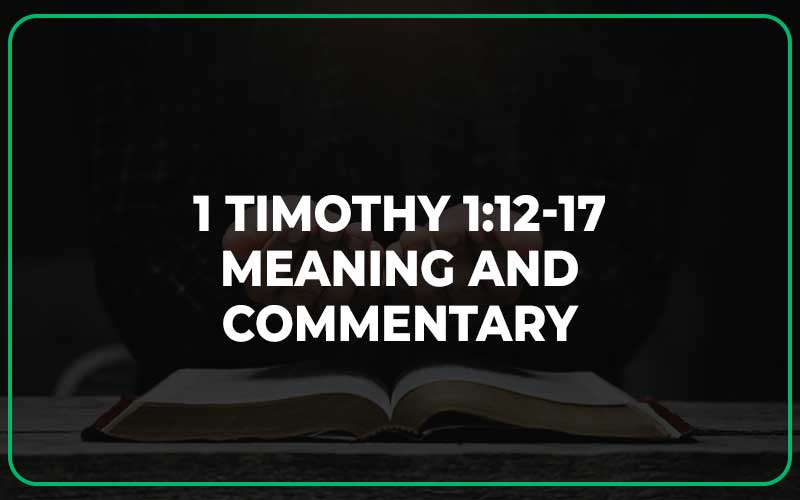1 Timothy 1:12-17
“I thank Christ Jesus our Lord, who has given me strength, that he considered me trustworthy, appointing me to his service. 13 Even though I was once a blasphemer and a persecutor and a violent man, I was shown mercy because I acted in ignorance and unbelief. 14 The grace of our Lord was poured out on me abundantly, along with the faith and love that are in Christ Jesus.
15 Here is a trustworthy saying that deserves full acceptance: Christ Jesus came into the world to save sinners—of whom I am the worst. 16 But for that very reason I was shown mercy so that in me, the worst of sinners, Christ Jesus might display his immense patience as an example for those who would believe in him and receive eternal life. 17 Now to the King eternal, immortal, invisible, the only God, be honor and glory for ever and ever. Amen.”
1 Timothy 1:12-17 Meaning
In these verses, the Apostle Paul is reflecting on his own life and the incredible mercy and grace that God has shown him. He acknowledges that he was once a blasphemer, persecutor, and violent man, but God transformed him and entrusted him with the ministry of sharing the Gospel. Paul is overwhelmed by the magnitude of God’s forgiveness and love, and he wants to emphasize that no sin is too great for God to forgive.
1 Timothy 1:12-17 Commentary and Explanation
Paul, a former persecutor of Christians, experienced a radical transformation when he encountered Jesus on the road to Damascus. This encounter marked the beginning of his journey in serving as an apostle and spreading the Gospel. Throughout his ministry, Paul faced numerous challenges, including opposition, imprisonment, and physical suffering. Yet, he remains grateful to Jesus for His power and strength, which were made evident in Paul’s life.
Through Paul’s testimony, we learn that our past sins and failures do not disqualify us from God’s service. Just as Paul was appointed to serve despite his previous sinful behavior, we too can be trusted and called by God to fulfill His purposes. It is important to acknowledge our weaknesses and past mistakes but not to dwell on them. Instead, we should focus on the immeasurable grace and mercy that God extends to us.
The trustworthy saying that Paul shares reminds us of the central message of the Gospel: Jesus came into the world to save sinners. It is not the righteous who need saving but the sinful. In recognizing and accepting our own sinfulness, we open ourselves up to the transformative power of Christ’s forgiveness and salvation. This saying highlights the inclusivity and depth of God’s love, reaching out to even the worst of sinners.
Paul’s humility in declaring himself the worst of sinners serves as a reminder that none of us can claim moral superiority or earn our salvation through our own efforts. No matter how good we may think we are, we are all in need of God’s grace and mercy. This humble acknowledgement keeps us reliant on Christ, recognizing that our righteousness comes through faith in Him.
The mercy shown to Paul despite his past sins displays God’s patience and willingness to give second chances. God’s desire is not to condemn but to save. Through Paul’s transformation, God demonstrates His power to change lives and His willingness to use even the most unlikely individuals for His purposes. This serves as an encouragement for all believers that it is never too late for God to work in our lives, regardless of our past mistakes.
The conclusion of Paul’s testimony is a beautiful affirmation of God’s eternal kingship, His immortality, and His invisibility. It is a declaration of praise and honor to the only God, highlighting His eternal nature and ultimate authority. It reminds us that no matter what challenges we may face in this life, our hope and focus should always be on God and giving Him the glory He deserves.
Also Read: Hebrews 3 Meaning and Commentary
Context of 1 Timothy 1:12-17
The book of 1 Timothy is a letter written by the Apostle Paul to his young disciple Timothy. Paul wrote this letter to encourage Timothy in his pastoral responsibilities and to provide guidance regarding church leadership and the importance of sound doctrine.
In the particular passage of 1 Timothy 1:12-17, Paul is reflecting on his own journey of faith and the incredible grace and mercy he has received from God. He wants to emphasize to Timothy and the believers in Ephesus that no one is beyond the reach of God’s forgiveness and love. Paul offers his own story as evidence that even the most hardened persecutors of the faith can be transformed by the Gospel.
Lessons From 1 Timothy 1:12-17
- God can use anyone, regardless of their past sins or failures, for His purposes.
- We should be grateful for God’s grace and mercy, recognizing our need for His forgiveness.
- Humility is the key to receiving God’s mercy and experiencing His transformative power.
- No one is beyond God’s saving grace, and His patience extends to even the worst of sinners.
- Our focus should always be on giving honor and glory to God, acknowledging His eternal kingship.
Final Thoughts
Paul’s testimony in these verses reminds us of the power of God’s mercy and grace in our lives. No matter what we may have done in the past, we can find forgiveness, transformation, and purpose through Christ.
God’s desire is to save sinners and demonstrate His patience through us. Let us approach God with humility, grateful for His mercy, and focused on giving Him the honor and glory He deserves as the eternal King.

